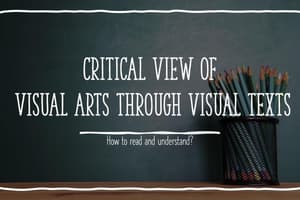Podcast
Questions and Answers
What is an example of a personal symbol as described in the text?
What is an example of a personal symbol as described in the text?
- A locket with a picture of a loved one (correct)
- Musical notation
- Ancient hieroglyphics
- The American bald eagle
How do birds communicate during the breeding season, according to the text?
How do birds communicate during the breeding season, according to the text?
- Through ancient hieroglyphics
- Using elaborate courtship displays involving flight patterns and sounds (correct)
- By performing rituals
- By wearing family crest jewelry
What role do symbols play in human communication, based on the text?
What role do symbols play in human communication, based on the text?
- Symbols make communication easier and more efficient (correct)
- Symbols hinder effective communication
- Symbols are only used in mythology
- Symbols have no impact on communication
What is the significance of the American bald eagle as mentioned in the text?
What is the significance of the American bald eagle as mentioned in the text?
Flashcards are hidden until you start studying
Study Notes
Symbolism: Understanding the Language of Signs and Symbols
Symbolism is a powerful tool used by humans to communicate complex ideas through simple visual representations. It transcends linguistic boundaries, allowing us to understand abstract concepts without relying solely on verbal communication. As a result, symbolism has been employed throughout history across various cultures and contexts.
Origin of Symbolism
The ancient Egyptians were among the first civilizations to employ extensive use of symbols in their culture. Egyptian hieroglyphics, one of the earliest forms of writing, relied heavily on symbols to convey meaning. This early form of symbolic expression laid the groundwork for many other cultures' adoption of similar methods, such as the Chinese characters and Greek alphabet.
Types of Symbols
Archetypes
Archetypes are universal symbols that have persisted across time and cultures, representing fundamental human experiences and emotions. Examples include the hero, the mother, and the trickster. These archetypal symbols often serve as a foundation for mythological narratives, providing a common framework for understanding storytelling across different societies.
Cultural Symbols
Cultural symbols, also known as iconic signs, are specific to certain groups or communities. They may represent shared values, beliefs, or traditions within a particular society or group, and can be artifacts like totems or flags, or non-material entities such as songs or rituals. For instance, the American bald eagle serves as a cultural symbol representing freedom and national pride in the United States.
Personal Symbols
Personal symbols are unique to individuals and hold personal significance for them. These may include objects or behaviors that carry emotional resonance, serving as keepsakes or reminders of important events or people in a person's life. Examples could be a locket holding a picture of a loved one or wearing a piece of jewelry with family crest engraved upon it.
Communication Through Symbolism
To understand how we communicate effectively using symbols, let's consider a real-life example from the world of nature: the bird breeding season. During this period, birds perform elaborate courtship displays involving flight patterns and sounds to attract potential mates. By interpreting these actions, observers can predict which species a bird belongs to and whether it is likely to reproduce successfully during the current breeding season.
Throughout history, humans have similarly developed systems of communication based on symbols. Examples range from ancient hieroglyphics mentioned earlier to more modern systems like musical notation or computer programming languages. In each case, symbols serve as shorthand for conveying intricate information succinctly, making communication easier and more efficient.
In conclusion, symbolism plays a critical role in human communication, enabling us to express complex ideas and share knowledge across diverse cultures and contexts. Whether exploring archetypal symbols found in mythology or observing the courtship of birds, studying symbolism reveals much about our capacity for creative expression and our innate desire to find meaning in the world around us.
Studying That Suits You
Use AI to generate personalized quizzes and flashcards to suit your learning preferences.




